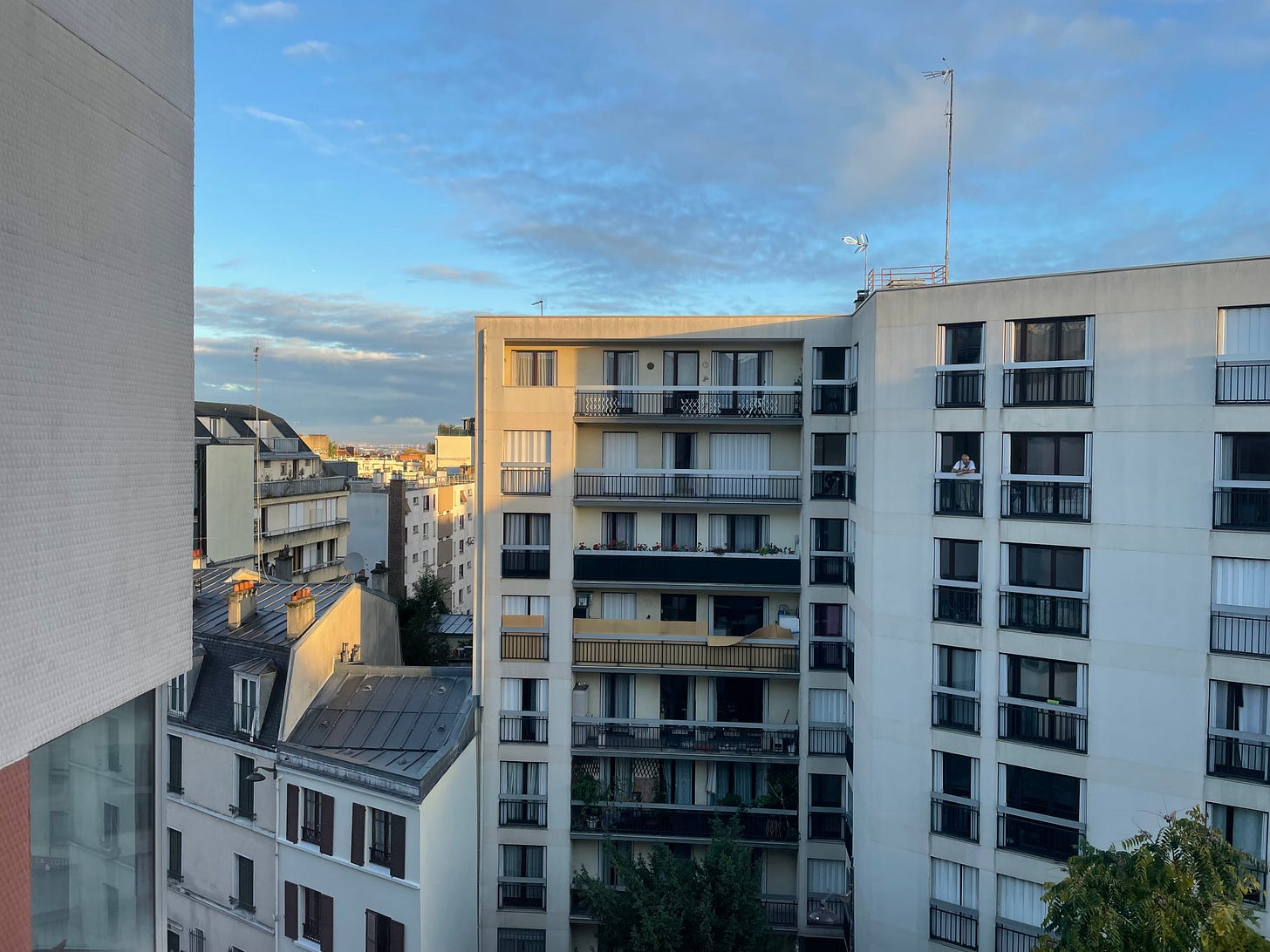the sadness (and soulagement) of reaching 'the end'
some brief notes on runny omelettes, a book I just finished, and why your paris expat novel is always gonna have an elderly female landlord, whether you like it or not
Last week, I finished the first draft of a novel I’ve been working on for the past 5 or 6 months. In many ways, it is very much what you’d expect for an expat novel set in Paris, but I’ve always enjoy working within established genres, rather than trying to do something radically different. Though they both fall under the broad heading of ‘literary fiction’, I think of the New York coming-of-age novel and the Paris expat novel as genre fiction, just as attached to their tropes, story beats, and recurring characters as hard sci-fi or fantasy.
In a Paris expat novel, for instance, there will always be an Elderly Female Landlord (EFL) who runs a ramshackle boarding house, renting a room—by the week, natch—to a Sad Young Man (SYM), always very poor and very young. The room, always on the top floor, is nestled in a garret with sloped ceilings, a shared WC, a malfunctioning hotplate, spiderwebbing cracks in the plaster, a pitched roof window that, when opened, provides a beautiful, if partial, view of Paris,1 and periodic infestations of either a.) rats or b.) cockroaches. The EFL will be outwardly quite grumpy and unapproachable (her hair, always gray, pulled back severely in a bun) but at some crucial point in the story—usually when the SYM has just lost something, like a girl or a job—she will give him a break on the rent, or insist that he come take his petit déj with her in the shared kitchen downstairs. Sitting on a rickety wooden chair in the cuisine, our hero will have a spiritual realization about the essential falseness of whatever it is he’s been chasing, along with a concomitant satisfaction in the simple pleasure of running one’s fork through une omelette baveuse. The SYM will be reminded of his mother, while the EFL will be reminded of her son (killed in the war) or her late husband (ditto).
When reading contemporary examples of a classic genre, I find myself playing the comparison game, and my enjoyment is in direct proportion to the inventiveness, and the self-awareness, with which the author wrings something new out of an old standard. The EFL can be a Martian, the SYM a vampire, and the omelette made of green eggs—it hardly matters, just so long as, from time to time, the author plays the refrain we all know and love.
My Paris expat novel is the story of K., an obscure American writer who falls in love with Juliette de L., a well-known French novelist who is also quite a bit older than he is. (15 years, to be precise.) K. is 100% SYM—though ‘Young’ should probably be replaced with ‘Youngish’—and throughout the composition process I was well aware of the ways in which he both did, and did not, conform to type. I was also quite conscious of not including an EFL, in part because of changed circumstances (no more boardinghouses in Paris, I’m afraid) and in part because it seemed like one refrain I could let rest.
After all, it’s been done so many times: Just off the top of my head, versions of the EFL appear in Giovanni’s Room, A Moveable Feast, Geoff Dyer’s Paris Trance,2 David Hoon Kim’s Paris is a Party, Paris is a Ghost, and Enrique Vila-Matas’ Paris ne finit jamais,3 in which the EFL is, incredibly, Marguerite fucking Duras. (This is, in fact, a true story—the real Vila-Matas did in fact rent a chambre de bonne from the real Duras.)
And yet it wasn’t until I started writing this post that I realized that an EFL, or perhaps the ghost of one, had crept into my story anyway. Looking at it now, Juliette de L. is the precise physical opposite of your standard EFL. Whereas the EFL is usually stout and homely, Juliette is tall and beautiful; whereas the EFL has her gray hair pulled back severely in a bun, Juliette’s hair, subtly and expensively highlighted, is messy, frizzy, uncontainable, and she always wears it down. While I was very conscious of whom I was modeling Juliette de L. on—Anglophone writers like Rachel Cusk, Sheila Heti, and Celia Paul, as well as several well-known female French writers of autofiction—I honestly didn’t think about whom I was modeling her against. The similarities are also striking: The EFL and Juliette both have bad teeth, they both lost men they loved in tragic circumstances, and they both remind the SYM, to varying degrees, of his mother. While writing, I was convinced that Juliette was an original creation.4 Now that it’s over, I feel regret, as well as a bit of relief, to find out she’s not.
For me, the New York coming-of-age novel and the Paris expat novel exist in a kind of equal but opposite relation to one another—both concern the impossibility of constructing a coherent self within a large, ruthless metropolis.5 In New York, the impossibility stems from constant change, in Paris from its lack. In New York, the question is something like: How can I possibly?, while in Paris it’s something like: Why should I bother? The questions, however, are fixed to a particular place by tradition, rather than some inherent quality of the cities themselves. If you wanted to, you could switch them—New York, after all, is a pretty old city (400 years and counting) while Paris is quite new in relation to, for example, Marseille.
The New York of Joseph O’Neill’s Netherland has the exhausted and slightly hangdog air of Paris on a cloudy afternoon, while Virginie Despentes’s Vernon Subutex, which I reviewed here, has the manic energy of great New York films like Mean Streets and Uncut Gems. If you only Despentes’ work to go by, you would think that Paris is a much more chaotic and fast-paced city than it actually is. If you only had the typical expat novel to go by, you would think that the French were a minority in their own capital, only present to provide color or an occasional dash of authenticity to the proceedings.
All of which is to say that I’m happy the book is finished, and I hope that, like a great omelette, it provides the right mix of comfort and delight. I still have a bit of work to do on the final section, and hopefully in the coming months I’ll have some further updates. As always, thanks for reading.
Where the hero smokes his cigarettes and broods handsomely.
A great book, though I’ve never heard anyone mention it before. I guess because Dyer is so well-known for nonfiction? I only found it while doing a search for novels with the word ‘Paris’ in the title.
The title of the English translation is Never Any End to Paris, which is so fucking awful I couldn’t bear to include it in the main article. But the book itself I highly recommend.
"Original” in the sense that, while there are plenty of people like Juliette, there aren’t that many characters. The Famous Female Writer of Autofiction (FFWA) will soon, I’m sure, be just as recognizable as the EFL or SYM.
James Baldwin—who wrote both Giovanni’s Room and Go Tell It on the Mountain—is the only person I can think of who wrote a great Paris expat novel and a great New York novel, though I’d be happy to stand corrected: pariscityoflit@gmail.com.







A process question! And a good one! A real response would require another post, but at a certain point I realized that what I wanted to do, which was probably to write about Paris from the perspective of someone who knew it extremely well (like, say, Mavis Gallant) was impossible. And therefore I had to make the foreignness of my daily life, as well as my ignorance of most of what was happening around me, the subject of the book. The stream of discoveries would, itself, be the book. Weirdly enough, it was learning to read in French that provided both the central story and the permission to write a book about someone who doesn't know French and knows almost nothing about Paris. French writers, especially those who grew up here, rarely go to the trouble that expat authors do in writing about Paris—many of the best ones, I found, actually do little to no scene setting at all. If there's a scene at a brasserie, it's just some brasserie, if someone has an apartment on the Seine, it's somewhere on the Seine. We know it's fancy—the author's not going to bother giving us the precise rue or arrondissement. In many works, Paris is just sort of a stand in for any sort of big city, just in the way that New York and London can be in Anglophone literature. Reading in French demystified things a little I think, and helped me to see that telling a good story mattered more than impressing people with my grasp of Parisian history, landmarks, and so on.
When I saw this in my inbox I was delighted. Having read it I feel even more so. I recently had a conversation with a friend living in Austria (I myself am in Japan) about writing a novel with the goal of finishing it before our respective terms abroad reach their conclusion. Unlike you, both of us were/are trying to write about home while being away; I signed the death certificate on my attempt this year, but my friend is going to have a swing at writing his own.
For me the stream of discoveries that came along with life abroad prevented me from sticking to any one idea, and so longform projects such as a novel seemed pretty impossible, at least for the first year in Japan. How do you balance the foreignness of your daily life with the daily return to drafting a novel? Is it simply a question of acclimation?